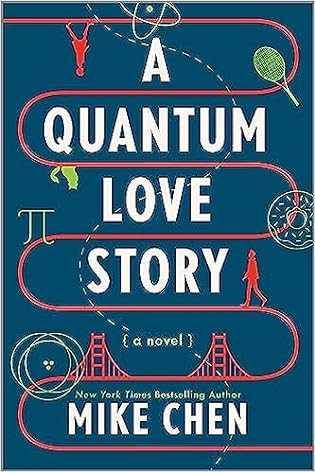 A Quantum Love Story
A Quantum Love Story by
Mike Chen Formats available: hardcover, paperback, ebook, audiobook
Genres: science fiction,
science fiction romance,
time travel Pages: 368
Published by Mira on January 30, 2024
Purchasing Info: Author's Website,
Publisher's Website,
Amazon,
Barnes & Noble,
Kobo,
Bookshop.org,
Better World Books Goodreads The only thing harder than finding someone in a time loop is losing them.
Grieving her best friend's recent death, neuroscientist Mariana Pineda’s ready to give up everything to start anew. Even her career— after one last week consulting at a top secret particle accelerator.
Except the strangest thing a man stops her…and claims they've met before. Carter Cho knows who she is, why she's mourning, why she's there. And he needs Mariana to remember everything he’s saying.
Because time is about to loop.
In a flash of energy, it’s Monday morning. Again. Together, Mariana and Carter enter an inevitable life, four days at a time, over and over, without permanence except for what they share. With everything resetting—even bank accounts—joy comes in the little a delicious (and expensive) meal, a tennis match, giving a dog his favorite treat.
In some ways, those are all that matter.
But just as they figure out this new life, everything changes. Because Carter's memories of the time loop are slowly disappearing. And their only chance at happiness is breaking out of the loop—forever.
Welcome to the blog tour for A Quantum Love Story by Mike Chen. This is another author who I discovered through participation in a blog tour, so I’m thrilled to be back again with another book and tour. I’ve already finished A Quantum Love Story and loved it, so look forward to that review late next week. But the book is coming out TOMORROW, so here’s an excerpt from the very first chapter to whet your reading appetite for the whole, quantum tangle of this story!
Excerpt from Chapter 1 of A Quantum Love Story by Mike Chen
1
Carter Cho wasn’t really into science experiments.
Otherwise, he might have completed his degree in quantum mechanics. Cooking experiments, though? Totally different, because there was a real joy to that process. But setting a hypothesis, identifying controls, and looking for…stuff?
Seriously, that seemed like such a slog.
Except for this particular Thursday morning, on the corner of a crosswalk and standing across from the world’s biggest, most advanced particle accelerator, a science experiment felt necessary.
He didn’t really have a choice. It seemed to be the only way to possibly understand or even escape his very strange predicament.
Carter checked the time on his phone, waiting for it to tick specifically to twenty-three seconds past 8:22 a.m.
At that moment, the crosswalk light would switch, signaling for pedestrians to go.
Then everything would cascade, a waterfall of specific actions by the world around him:
The person on Carter’s right would step out first.
The person behind him would wait an extra four seconds, eyes stuck on his phone.
Annoyed, the woman next to that person would let out an exaggerated sigh, move around, then rush forward six steps into the street before catching her shoe.
Then she would stumble forward, her coffee spilling. The first time he went through this, he’d noticed the spill just in time to sidestep it before continuing on.
All of these actions sat line by line on the old-fashioned paper notebook in his hands, a checklist of what was to come with the precision delivered by his photographic memory.
Science experiments all led to a result. As for this, he wasn’t quite sure what the result, or even the purpose, might be. He already knew he was in a loop of some sort, something that started the instant he woke up on Monday mornings.
And it always ended up with the huge facility across the street exploding.
The Hawke Accelerator, both a modern marvel of technology circa 2094 and also some sort of weird top-secret project that no one really understood—now also the place that would simply go boom.
Carter should know. The first time he experienced this, he was in the accelerator chamber’s observation room, right in the heart of where the go boom happened at precisely 12:42 p.m. on Thursday. Which was today, again. Just a few hours from now.
He’d been through this six times before, each time expanding his acute understanding of the details surrounding him. Usually he wrote things down at the end of the day, a memory trick he’d
learned about himself very early on that helped cement the details into place, so even when he started the loop over without any scribbled notes to organize his thoughts, his photographic memory recalled it.
But this morning, he went in reverse, writing out the exact steps as they were meant to be.
And then he’d make sure it played out that way, bit by bit.
After that, he wasn’t sure. Carter thought of his parents, their usual voices chastising him for his lack of planning and forethought, how his teenage foray into coding and hacking was more about fun than applying himself, and now look at him, simply a technician running tests and tightening screws. Even now that he’d been through this loop several times, he hadn’t bothered to call them back from their birthday messages. Part of him used the excuse that he should stay as close to the original path as possible, but he knew better.
Even if this weird loop existence meant a complete lack of consequences, calling his parents was the last thing he wanted to do.
Carter checked his phone one more time, five seconds remaining until the crosswalk kicked off the sequence. He gripped the notebook, staring at the list of things to come.
A chime came from the crosswalk. And Carter began to move.
The person on the right moved.
The man behind Carter stayed.
An exasperated sigh came from behind him. Carter kept his eyes on his notebook, counting steps in his head. “Ack,” the woman said, right when Carter sidestepped. His focus moved down to the next item on the list, then the next, then the next, not once looking up. Instead, he executed through a combination of memory and instinct, sliding sideways when a cyclist rolled by on the sidewalk and slowing down just enough to follow in a group waiting at the front entrance of Hawke.
Someone coughed, marking a time to pause and wait thirteen seconds, enough time to review the next items on the notebook still in front of him:
Front desk hands out mobile device for the David AI digital assistant.
Security guard says something about visiting group from ReLive project.
Passing scientist asks what time Dr. Beckett’s flight gets in.
He moved through the security gate designated for employees, taking him past the lobby threshold and over to the main hallway that split in three directions. He stopped, leaned against the wall and waited for the final item to come to pass. Nothing special or unique, just the sound of heels walking in a hurried cadence from his right to his left. Carter checked the notebook, waiting for the visitor’s David AI to speak exactly what he wrote.
“Your next meeting starts in two minutes,” the AI said from the small mobile unit in his familiar London accent. “Oops! Looks like you might be late. Should I give the meeting notice of that?”
Carter mouthed the words as the visitor spoke, his voice fading down the hallway. “No, thanks. I’ll just hurry.”
David’s simulated voice could still be heard as Carter put the notebook down, holding it at his side while considering what just happened. He wasn’t particularly religious, though part of him wondered if he’d been condemned to some sort of purgatory. The predictability of it all, the strange exactness of everything he saw playing out as written on the notebook in his hands.
The first few times, he’d felt disbelief. Then curiosity. Then amusement.
This time, well, he guessed that was the purpose of this experiment: to figure out how he felt knowing he could predict every exact movement of every person he encountered.
Disbelief, curiosity, amusement, and now the whole thing was just unnerving.
Nothing out of turn. Nothing different. Nothing unexpected.
He blew out a sigh, hands pushing back his wavy black hair. Something tugged at him, a wish for things to be different. A person walking from his left instead of his right. Or the plant behind him coming to life and biting his arm. Or a piano dropping out of the sky and smashing his foot.
Anything at all to end this.
Ten minutes passed with Carter lost in his own thoughts, but that in itself turned out to be a change. Normally, he’d take a walk to clear his head, but the list’s finality wound up freezing him. All the previous loops, he’d tried to follow his original path as closely as possible, always ending back in the observation room where the accelerator started to deteriorate and a massive blast of energy struck him. Perhaps that was the only real difference, as he’d changed spots in those final moments to see exactly where the bolt landed on the floor, even using his photographic memory to draw a precise grid of the floor panels.
What he could do with that information, he wasn’t sure. But it had to mean something.
This time, though, a weight paused him, an all-encompassing blanket that left him pondering far longer than he’d ever done.
And then it hit him: he’d deviated farther from his path than before, and nothing bad had happened.
Heck, if he wanted something bad to happen simply so it could, maybe it’d be best if he pushed farther. Or even went in the complete other direction.
At this point, he’d normally turn right, check in with the technician’s desk, grab his cart of tools and begin going through his assignments for the day. But a sharp, almost foreign defiance grabbed him.
He would turn left. He would not check in with his supervisor. Instead he’d go…
Carter’s eyes scanned, looking for the most opposite thing he could possibly do.
Of course.
His steps echoed as he pressed ahead, a strange jubilance to his feet. He moved around people milling about or talking about actual work things, practically skipping with joy until he turned to the entrance of the Hawke cafeteria and straight to the bakery station and its waft of morning pastries.
Ten minutes passed with Carter lost in his own thoughts, but that in itself turned out to be a change. Normally, he’d take a walk to clear his head, but the list’s finality wound up freezing him. All the previous loops, he’d tried to follow his original path as closely as possible, always ending back in the observation room where the accelerator started to deteriorate and a massive blast of energy struck him. Perhaps that was the only real difference, as he’d changed spots in those final moments to see exactly where the bolt landed on the floor, even using his photographic memory to draw a precise grid of the floor panels.
What he could do with that information, he wasn’t sure. But it had to mean something.
This time, though, a weight paused him, an all-encompassing blanket that left him pondering far longer than he’d ever done.
And then it hit him: he’d deviated farther from his path than before, and nothing bad had happened.
Heck, if he wanted something bad to happen simply so it could, maybe it’d be best if he pushed farther. Or even went in the complete other direction.
At this point, he’d normally turn right, check in with the technician’s desk, grab his cart of tools and begin going through his assignments for the day. But a sharp, almost foreign defiance grabbed him.
He would turn left. He would not check in with his supervisor. Instead he’d go…
Carter’s eyes scanned, looking for the most opposite thing he could possibly do.
Of course.
His steps echoed as he pressed ahead, a strange jubilance to his feet. He moved around people
milling about or talking about actual work things, practically skipping with joy until he turned to the entrance of the Hawke cafeteria and straight to the bakery station and its waft of morning pastries.
“Don’t worry about it. It’s totally fine. I, uh,” he said. She bit down on her lip, brow scrunched, though eventually they locked gazes. “I should have watched where I was going.” He gestured at the growing coffee stain on his outfit.
“You sure?”
“Absolutely. It’s work clothes. It gets dirty. No big deal.”
The woman’s expression broke, relief lifting her cheeks into a toothy grin, one of those unexpected sights that made everything a little bit better. She looked back at the group, then the coffee cup in her hands. “Damn it, I spilled a bunch. Is there a place to get a refill?”
“You’re going to the main conference room?”
“Yeah. Spent all week there.”
All week. All the times Carter had been through the loop before, even seen the names of various guest groups on schedules, and yet they’d never crossed paths—not until he did the exact opposite of his routine.
Funny how that worked.
“We finally get to see the observation room, though. In a little bit.” She held up her coffee cup. “Just need a refill somewhere along the way.”
“Café is back there,” he said, thumb pointing behind him. “Way back there.”
“Ah,” she said with furrowed brow, a conflicted look that seemed about much more than a coffee refill. “Probably should meet with the team. Not enough time.”
Not enough time. The concept almost made Carter laugh. “Well,” he said, pulling out a bag, “a donut for making you late?”
She took the bag and peaked inside, cheeks rising with a sudden smile. “I don’t usually like donuts. But these glazed ones. Simple, you know?” She shuffled the bottom of the bag to nudge the donut out the opening. “Are you sure? I spilled coffee on you.”
“Yeah. I’m, uh,” he started, pausing as their gazes lingered. “My fault for running into you.”
The wrapper crinkled as she examined it up close before taking a small bite. “I should get back to my team. Maybe they’ll hand out free coffee by the time we get to the observation room. Thanks for this.”
Carter dipped his chin, a quick farewell as he considered the inevitability of the next few hours, a march toward a chaotic and violent reset. He matched her smile, though as she turned, he pondered saying something.
Normally, he wouldn’t. But with the world exploding soon? He went with the opposite of normal.
“My name’s Carter, by the way,” he said. “Carter, the guy who gives people donuts.”
Her gaze shifted, first looking at the floor, then up at the ceiling, even at the bag on her shoulder before finally locking eyes again. “Mariana,” she said, holding up the donut bag, “the woman always looking for coffee.” She bit down on her lip before glancing around. “I’m going to tell you something completely random.”
“Okay?” Carter said slowly. “About donuts?”
She laughed, an easy, bright laugh, though her eyes carried something far heavier. “No. The group I’m with. We’re touring the facility. But I’m quitting. They don’t know yet. Today’ll be my last day. Science is great until it’s not.” Her shoulders rose and fell with a deep breath. “I don’t know why I’m telling you this. Probably because we’ll never see each other again.” She spun on her heel, an abrupt move followed by determined steps forward.
“Not unless you need another glazed donut.”
She turned, slowing as she walked away backward, this mystery scientist who spilled coffee on him and then caught his attention. Because the idea that someone didn’t like most donuts, well, that
was as opposite as anything he’d ever encountered in his life. “Maybe that,” she said with a small grin.
“I’ll remember your name in case we do,” he said. “Mariana.”
Her fingers fluttered in a quick wave, then she turned, and Carter leaned against the wall, ignoring the people who came and went.
Mariana. Maybe he should write that down, just in case she became important. He pulled the notebook out from under his arm, only to find the pages soaked with coffee.
A pen would rip through those pages. He’d have to trust his memory to recall her name, her voice, her face. On the off chance that they ever met again.
None of it mattered anyway, but as experiments went, this morning did at least prove helpful.
Now Carter knew that he could do anything, even the opposite of normal. And that might just lead to him escaping this thing. Or, at the very least, a lot more pastries.
Mariana disappeared into the sea of people, and as she did, her words echoed in his mind. First her group went to the conference room, then the observation room above the accelerator core. He knew that space well; after all, he’d been in that same room when everything began to explode and—
Wait.
That was it. A possible connection that he’d somehow missed before. He’d been there, of all places, summoned to check some of the power conduits lining the walls as the whole thing fell apart. Could that exact space be important?
Carter’s head tilted up. Maybe the observation room held the key to everything.
And if it did, what would happen if others were caught in it too?
Excerpted from A Quantum Love Story by Mike Chen. Copyright © 2024 by Mike Chen. Published by arrangement with Harlequin Books S.A.
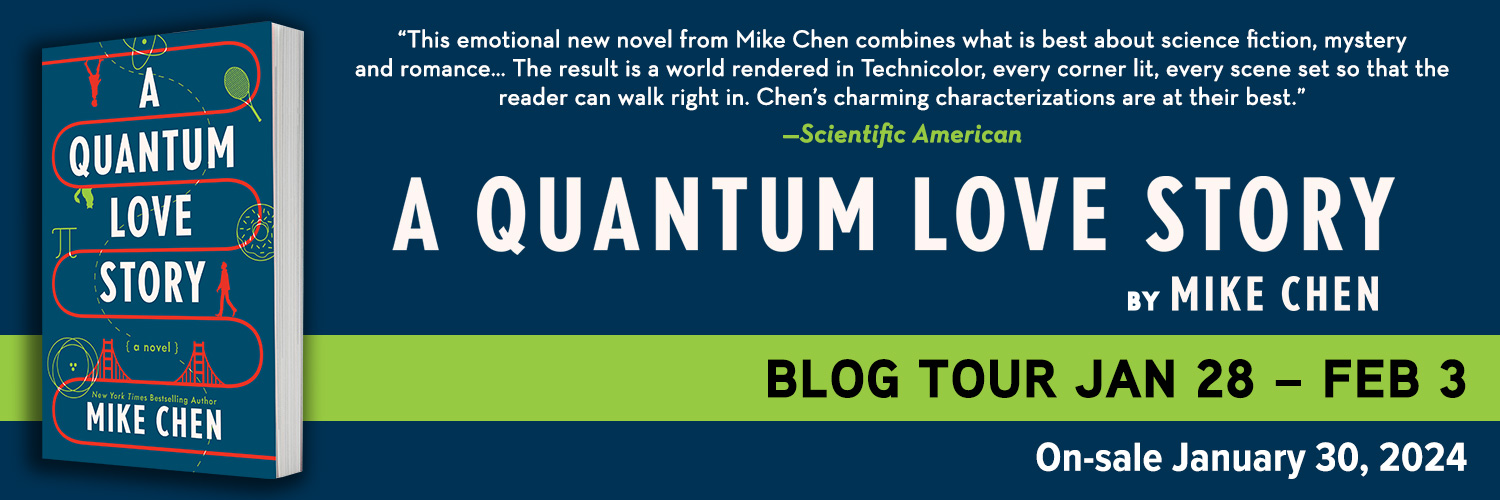
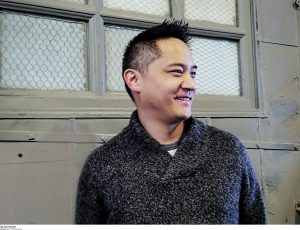 About the Author:
About the Author:
Mike Chen is the New York Times bestselling author of Star Wars: Brotherhood, Here and Now and Then, Light Years from Home and other novels. He has covered geek culture for sites such as Nerdist, Tor.com and StarTrek.com, and in a different life, he’s covered the NHL. A member of SFWA, Mike lives in the Bay Area with his wife, daughter and many rescue animals. Follow him on Twitter and Instagram: @mikechenwriter.
WEBSITE | TWITTER | INSTAGRAM | GOODREADS
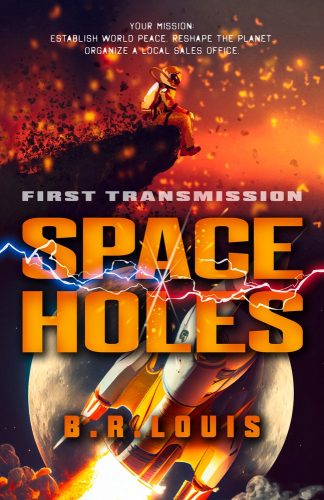 Space Holes (First Transmission, #1) by B.R. Louis
Space Holes (First Transmission, #1) by B.R. Louis 
 The Annual Migration of Clouds by
The Annual Migration of Clouds by  Escape Rating A-: I picked up this book because I read the sequel to this,
Escape Rating A-: I picked up this book because I read the sequel to this,  The Citadel of Weeping Pearls (Xuya Universe) by
The Citadel of Weeping Pearls (Xuya Universe) by 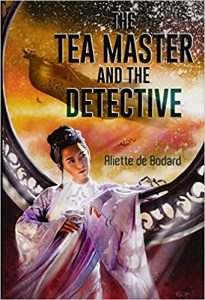 I’ve been nibbling at the vast, sprawling
I’ve been nibbling at the vast, sprawling  But nothing is quite as it seems, as the possibility of going back and bringing the Citadel forward forces everyone who has been touched by its disappearance to rethink what they did then, what they’ve felt in the absence of the shooting star that is/was Bright Princess Ngoc Minh, and what they might do with a second chance.
But nothing is quite as it seems, as the possibility of going back and bringing the Citadel forward forces everyone who has been touched by its disappearance to rethink what they did then, what they’ve felt in the absence of the shooting star that is/was Bright Princess Ngoc Minh, and what they might do with a second chance.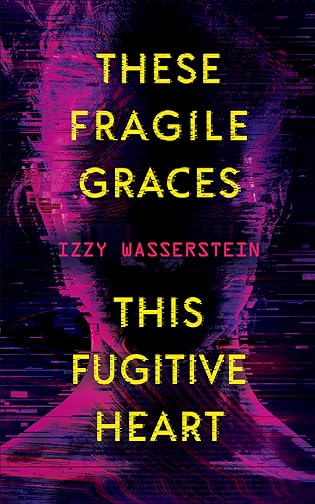 These Fragile Graces, This Fugitive Heart by
These Fragile Graces, This Fugitive Heart by 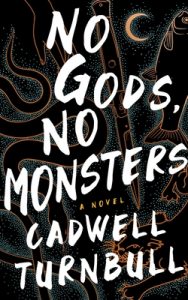 I also would have loved a bit more about the anarchist and commune movement as it applied to this particular story, because I was basing all of my knowledge and acceptance of the way that part of their world worked on Cadwell Turnbull’s fantastic
I also would have loved a bit more about the anarchist and commune movement as it applied to this particular story, because I was basing all of my knowledge and acceptance of the way that part of their world worked on Cadwell Turnbull’s fantastic 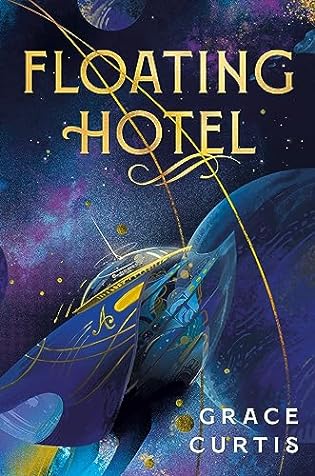 Floating Hotel by
Floating Hotel by 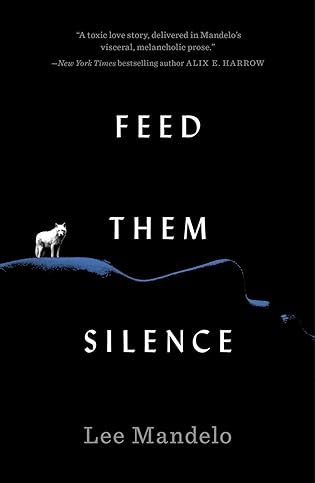 Feed Them Silence by
Feed Them Silence by 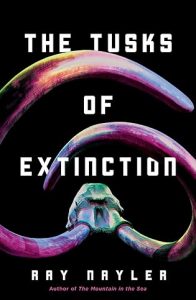 The process of becoming one with her wolf sounded exactly like the process portrayed in the
The process of becoming one with her wolf sounded exactly like the process portrayed in the 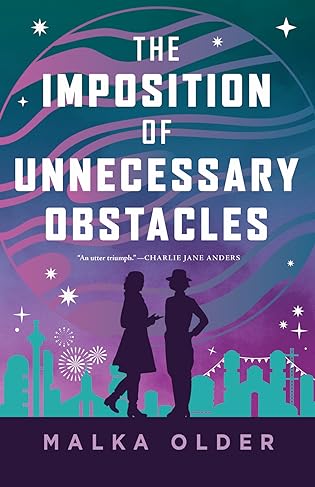 The Imposition of Unnecessary Obstacles (Mossa & Pleiti, #2) by
The Imposition of Unnecessary Obstacles (Mossa & Pleiti, #2) by 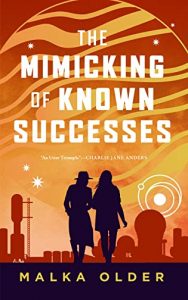 Escape Rating A+: There’s something supremely comforting about this series – and I’m oh-so-happy it IS a series because
Escape Rating A+: There’s something supremely comforting about this series – and I’m oh-so-happy it IS a series because  A Quantum Love Story by
A Quantum Love Story by  Escape Rating B+: If the blurb or the description above are making you think of the movie
Escape Rating B+: If the blurb or the description above are making you think of the movie  But the chasing down of just how many different time loop stories this one brought to mind kept me from being as invested in Carter and Mariana’s problem solving through their loops, although the emotional journey they took did hold my interest even as it briefly looked like it was heading for
But the chasing down of just how many different time loop stories this one brought to mind kept me from being as invested in Carter and Mariana’s problem solving through their loops, although the emotional journey they took did hold my interest even as it briefly looked like it was heading for  A Quantum Love Story by
A Quantum Love Story by 
 About the Author:
About the Author: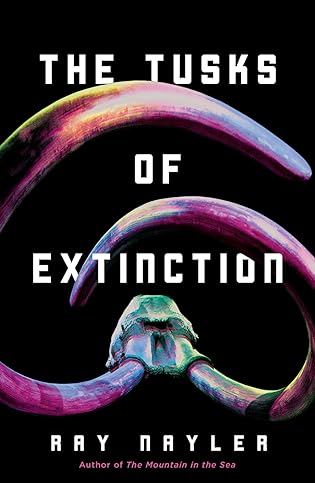 The Tusks of Extinction by
The Tusks of Extinction by 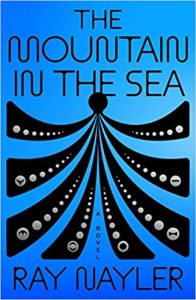 Escape Rating A-: I picked this one up because I utterly adored the author’s debut novel,
Escape Rating A-: I picked this one up because I utterly adored the author’s debut novel,